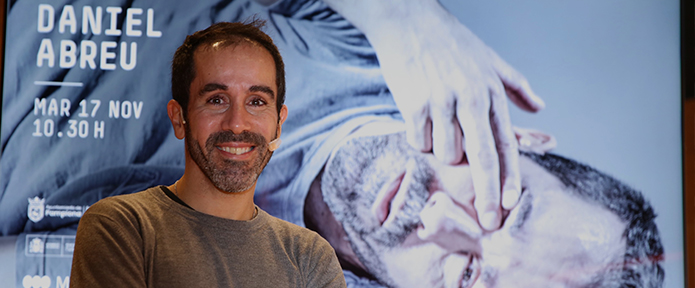Daniel Abreu, on "El hijo", which premieres at the MUN: "It is a symbolic and very visual work, which speaks of union and future".
As part of the 'Museo en Danza' cycle, the performance will take place on Thursday, November 19.

The loneliness and intimacy of Daniel Abreu 's (Tenerife, 1976) studio were the ingredients that accompanied the gestation of El hijo, a show that the choreographer and dancer will premiere on Thursday, November 19, at 7:30 p.m., in the Museo Universidad de Navarra. After the success of La desnudez, the last work of his dance company, and Abisal, created for Lava Compañía de Danza, Abreu resumed an inner path: "I wanted to work in a much more intimate way, alone, to present something that had more to do with me, to find myself again as a dancer and with that imaginary that welcomes me when I start to create".
In this journey was born this work that deals with the transmission from parents to children and the relationship with that inheritance received. "The title leads us to think that El hijo could be a child, but for me it has nothing to do with that. The son is the offspring, the commitment to continuity," explained the 2014 National Dance Prize winner.
NATURAL FEATURES
In this sense, he values that "dance allows us a non-linear narration because life is complex in its forms. Therefore, I tried to be possessed by images. It is a symbolic and very visual work that speaks of union, of the future. I use elements of nature to show pictures of a person who faces more with himself than with his parents or with that future".
In the presentation of this work he was accompanied by Teresa Lasheras, assistant director of Performing Arts at the Museum, who highlighted "his long and interesting career as a performer and as a creator, with more than 60 creations that have been seen in 40 countries".
The show is part of the cycle Museo en Danzaof which Abreu was the guest artist at this year's creative residency. Due to the reduction of seats due to the pandemic, the premiere of the piece Desde la ternura, inspired by a photograph by Ortiz Echagüe, has been postponed to May 8. In addition, this week he will be teaching a Contemporary Dance workshop at the Museum, whose places are sold out.
BODY ON THE EDGE
The son also connects with the exploration that the author has been approaching in his work, with a singular sensibility that translates into movement. "The work demands a very high physicality from me. It plays with a mobility that until now I had not put into play, which has to do with the fragmented. It demands that my body be much more exposed, at the limit." In this sense, she recognizes the complexity of the creative process, in solitude and full of questions.
Another novelty of El hijo is the use of projections. Through them, the author wants to talk about "the unreal" and generate "a fantastic world": "There is a questioning of life, which we can even take to the pandemic. This moment we have all lived through of loneliness in which there are things that do not seem real to you". The soundtrack also contributes to delve into "the conflict between what is comfortable and what distorts, it is uncomfortable, but it remains".
The piece also walks between two essential points: "We are all children, we have that optimistic path of light, but we also die. And both have to be given. Thus, Abreu invites the audience to attend the performance with "openness. The child is what comes, what happens. The audience sees the play, picks it up and makes it their own. That is the greatest gift.